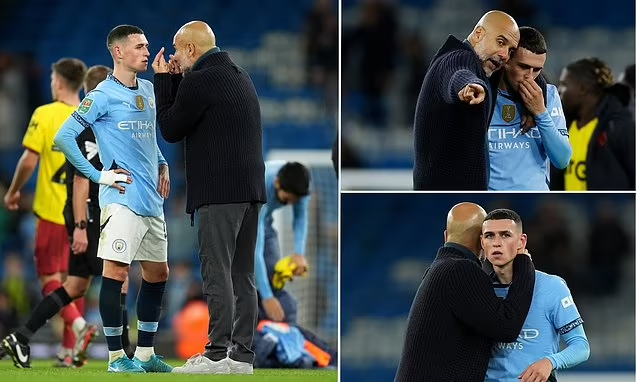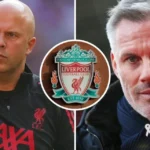Phil Foden and Pep Guardiola think the same thing about £60m Tottenham transfer

In the ever-evolving landscape of Premier League transfers, few moves generate as much intrigue as those backed by the game’s most astute minds. The proposed £60 million transfer of Morgan Gibbs-White from Nottingham Forest to Tottenham Hotspur represents precisely such a move, carrying with it the endorsement of two of English football’s most respected figures: Manchester City manager Pep Guardiola and England midfielder Phil Foden.
This potential blockbuster deal has sent shockwaves through the football world, not merely for its substantial fee, but for the quality of player it represents and the implications it holds for all parties involved. As Tottenham look to rebuild under new management and Nottingham Forest face the painful reality of losing their star assets, the transfer saga has become a microcosm of modern football’s complex dynamics.
The Player at the Center of the Storm
Morgan Gibbs-White, at just 25 years of age, has emerged as one of the Premier League’s most exciting midfield talents. His journey to this pivotal moment has been one of steady progression, marked by resilience, skill development, and an unwavering commitment to excellence that has caught the attention of football’s elite.
Standing at the heart of Nottingham Forest’s midfield, Gibbs-White has transformed from a promising youngster into a player capable of dictating the tempo of Premier League matches. His technical ability, combined with an innate understanding of the game’s tactical nuances, has made him indispensable to Forest’s recent success and a coveted asset in the transfer market.
The midfielder’s statistical output tells only part of his story. With seven goals and eight assists in the Premier League during the 2024/25 season, Gibbs-White demonstrated his ability to influence games at both ends of the pitch. However, it’s his intangible qualities – his leadership, work rate, and ability to elevate teammates’ performances – that have truly set him apart from his contemporaries.
His playing style embodies the modern midfielder’s evolution: technically gifted enough to unlock defenses with incisive passes, physically robust enough to compete in the Premier League’s demanding environment, and tactically astute enough to adapt to different systems and requirements. These qualities have not gone unnoticed by those who understand football at its highest level.
Elite Endorsements: When Guardiola and Foden Agree
The significance of having both Pep Guardiola and Phil Foden publicly endorse a player cannot be overstated. Guardiola, widely regarded as one of the greatest tactical minds in football history, is notoriously selective with his praise. His description of Gibbs-White as “exceptional” carries weight that extends far beyond mere politeness.
Guardiola’s assessment came after witnessing Gibbs-White’s performances during Forest’s remarkable 2024/25 campaign, where they held a Champions League qualification spot for more than half the season. For a manager who has worked with some of the world’s finest players – from Lionel Messi and Xavi to Kevin De Bruyne and Bernardo Silva – to single out a player from a recently-promoted side speaks volumes about Gibbs-White’s quality.
Phil Foden’s endorsement carries equal significance, albeit from a different perspective. As a player who has consistently performed at the highest level for both club and country, Foden’s recognition of talent carries the authenticity of peer-to-peer respect. His simple yet powerful comment – “what a player” – on Gibbs-White’s Instagram post following England U21’s European Championship semi-final victory demonstrated the genuine admiration that exists between the two players.
This moment, captured after Gibbs-White’s man-of-the-match performance against Israel, where he scored and orchestrated England’s victory, highlighted the midfielder’s ability to perform when it matters most. The fact that Foden, who has won multiple Premier League titles and played in Champions League finals, took the time to acknowledge his international teammate’s brilliance speaks to the respect Gibbs-White commands among elite players.
Nottingham Forest’s Remarkable Journey
To understand the full significance of this transfer, one must appreciate the context of Nottingham Forest’s extraordinary recent history. The club’s journey from the Championship to becoming Champions League contenders represents one of modern football’s most compelling narratives.
Forest’s transformation under various managers has been nothing short of remarkable. From their promotion to the Premier League to establishing themselves as a competitive force, the club has defied expectations at every turn. Central to this success has been their ability to identify and develop talent, with Gibbs-White serving as the perfect example of this philosophy.
The midfielder’s arrival from Wolverhampton Wanderers in 2022 initially raised eyebrows, with many questioning whether Forest had overpaid for a player yet to establish himself at the highest level. However, his subsequent performances vindicated the club’s faith, with Gibbs-White becoming the creative heartbeat of a team that consistently punched above its weight.
His partnership with players like Anthony Elanga created a dynamic attacking partnership that troubled even the Premier League’s most established defenses. Together, they formed a creative axis that was instrumental in Forest’s impressive campaign, with their combined goal contributions representing a significant portion of the team’s attacking output.
The statistics paint a clear picture of Gibbs-White’s importance to Forest’s success. His seven goals and eight assists in the Premier League placed him among the division’s most productive midfielders, while his overall play – encompassing defensive work, chance creation, and leadership – made him irreplaceable to the team’s system.
Tottenham’s Ambitious Rebuild
For Tottenham Hotspur, the pursuit of Morgan Gibbs-White represents more than just another transfer – it symbolizes a club’s determination to return to the upper echelons of English football. Following a disappointing 17th-place finish in the Premier League, which was only salvaged by their historic Europa League triumph, Spurs have embarked on an ambitious rebuild under new management.
The appointment of Thomas Frank as manager marked a new chapter for the club, with the Danish tactician bringing fresh ideas and a proven track record of maximizing player potential. Frank’s success at Brentford, where he transformed the club from Championship outsiders to established Premier League competitors, made him an attractive option for Tottenham’s hierarchy.
The club’s transfer strategy this summer has been both aggressive and targeted, with the Gibbs-White deal representing the centerpiece of their recruitment drive. Having already secured Mohammed Kudus for £55 million, Tottenham have demonstrated their willingness to invest heavily in quality players who can make an immediate impact.
The potential addition of Gibbs-White to a midfield that already includes talents like James Maddison, Dejan Kulusevski, and new signing Kudus would create one of the Premier League’s most technically gifted midfield units. The competition for places would be fierce, but it’s precisely this depth that Tottenham have been lacking in recent seasons.
Their previous campaign was severely hampered by injuries, with key players spending significant periods on the sidelines. The lack of adequate squad depth meant that when injuries struck, the team’s performance levels dropped dramatically. By adding quality players like Gibbs-White, Tottenham are addressing this fundamental weakness while also raising the overall standard of their squad.
The Financial Implications
The proposed £60 million fee for Gibbs-White represents a significant investment, but one that reflects the current market reality for proven Premier League talent. In an era where clubs regularly pay similar amounts for potential rather than proven quality, the fee for a player of Gibbs-White’s caliber and Premier League experience can be seen as reasonable.
For Tottenham, the investment represents a statement of intent. Having secured Champions League qualification through their Europa League victory, the club is determined to establish themselves as consistent European competitors. The revenue streams associated with Champions League participation help justify such expenditure, while the potential for player value appreciation makes the deal financially sensible.
The structured nature of modern transfers means that the £60 million fee is likely to be paid over several years, with various performance-related clauses built into the agreement. This approach allows clubs to manage their cash flow while incentivizing player performance, creating a win-win scenario for all parties involved.
For Nottingham Forest, the fee represents a massive return on their 2022 investment. While losing a player of Gibbs-White’s quality is undoubtedly painful, the financial windfall provides opportunities to strengthen other areas of the squad and continue their project of sustainable growth.
The Legal Complications
The transfer saga took an unexpected turn when reports emerged of Nottingham Forest contemplating legal action against Tottenham, alleging an improper approach for Gibbs-White. This development highlights the complex regulations governing player transfers and the importance of following proper protocols.
The concept of “tapping up” – making unauthorized approaches to players under contract – is taken seriously by football’s governing bodies. While such practices are widely believed to occur informally, clubs must be careful to follow official channels when expressing interest in players. The suggestion that Tottenham may have breached these protocols has temporarily paused the transfer process.
This legal uncertainty has created an atmosphere of tension around the deal, with Gibbs-White reportedly having been prepared for his medical before the complications arose. The resolution of these issues will be crucial in determining whether the transfer can proceed as planned.
Such complications are not uncommon in high-profile transfers, where the stakes are high and clubs are protective of their valuable assets. The outcome of this particular dispute could set precedents for how similar situations are handled in the future.
The Broader Transfer Window Context
The Gibbs-White transfer must be viewed within the context of Tottenham’s broader summer recruitment strategy. The club has been one of the most active in the transfer market, with their spending already exceeding £180 million when including the potential Gibbs-White deal.
This level of investment represents a significant shift in Tottenham’s approach to the transfer market. Historically, the club has been more conservative in their spending, often prioritizing value over immediate impact. The current strategy suggests a recognition that competing at the highest level requires substantial financial commitment.
The signings of players like Kudus, Luka Vuskovic, and Kota Takai, alongside the permanent deals for Mathys Tel and Kevin Danso, demonstrate a comprehensive approach to squad building. Rather than focusing on one or two marquee signings, Tottenham are addressing multiple positions while building depth across the squad.
This holistic approach reflects lessons learned from their previous struggles with squad depth. The demanding nature of modern football, with its congested fixture lists and high injury rates, requires clubs to have quality options in every position. By investing heavily in the current window, Tottenham are positioning themselves for sustained success rather than short-term gains.
Impact on Nottingham Forest’s Future
The potential loss of both Morgan Gibbs-White and Anthony Elanga in the same transfer window represents a significant challenge for Nottingham Forest. Both players were instrumental in the club’s impressive recent form, and their departures would leave considerable voids in the squad.
Elanga’s £55 million move to Newcastle United, combined with the potential Gibbs-White sale, would generate substantial revenue for Forest. However, the club faces the difficult challenge of replacing two of their most creative and productive players. The timing of these departures, coming so late in the transfer window, makes the task even more challenging.
The situation highlights the harsh realities of modern football economics. Despite Forest’s remarkable progress and the loyalty shown by players like Gibbs-White, the allure of Champions League football and significantly higher wages makes it difficult for clubs to retain their best talents.
Forest’s ability to navigate this transition period will be crucial in determining their trajectory for the upcoming season. The club’s recruitment team faces the challenge of identifying players who can fill the creative void left by Gibbs-White and Elanga while maintaining the team’s competitive edge.
The Champions League Factor
The importance of Champions League qualification in modern football cannot be overstated, and its influence on the Gibbs-White transfer saga is undeniable. Tottenham’s qualification for Europe’s premier competition provides them with significant advantages in the transfer market, including increased revenue, enhanced prestige, and the ability to attract top-tier talent.
For players like Gibbs-White, the opportunity to compete in the Champions League represents a career-defining moment. Having established himself as a Premier League-quality player, the chance to test himself against Europe’s elite is understandably appealing. The Champions League provides a platform for players to showcase their abilities on the biggest stage, potentially leading to international recognition and career advancement.
The financial benefits of Champions League participation are substantial, with clubs receiving significant prize money and commercial opportunities. This additional revenue stream helps justify the substantial transfer fees involved in deals like the Gibbs-White move, creating a virtuous cycle where European success enables further investment in squad quality.
For Nottingham Forest, the failure to secure Champions League qualification despite their impressive campaign highlights the fine margins that exist in modern football. The difference between European football and domestic-only competition can be measured not just in financial terms, but in a club’s ability to retain and attract talent.
Conclusion: A Transfer Defining Modern Football
The Morgan Gibbs-White transfer saga encapsulates many of the defining characteristics of modern football: the importance of elite endorsements, the financial power of Champions League qualification, the complexities of transfer regulations, and the emotional impact of losing key players.
Whether the deal ultimately proceeds will depend on the resolution of the legal complications surrounding the alleged improper approach. However, the very fact that a player of Gibbs-White’s profile can command such attention and investment demonstrates the evolving nature of the transfer market.
For Tottenham, securing Gibbs-White would represent a significant statement of intent as they seek to re-establish themselves among the Premier League’s elite. The backing of figures like Guardiola and Foden provides validation for their pursuit, while the player’s proven Premier League experience makes him an ideal fit for their ambitious plans.
The transfer window will continue to evolve, but the Gibbs-White saga has already provided compelling insights into the modern game’s dynamics. As clubs navigate the complex intersection of sporting ambition, financial reality, and regulatory compliance, deals like this one will continue to shape the landscape of elite football.
Ultimately, the story of Morgan Gibbs-White’s potential move to Tottenham represents more than just a transfer – it’s a narrative about ambition, recognition, and the relentless pursuit of excellence that defines football at its highest level. Whether in a Tottenham shirt or remaining at Nottingham Forest, Gibbs-White’s future promises to be as compelling as the journey that brought him to this pivotal moment.















